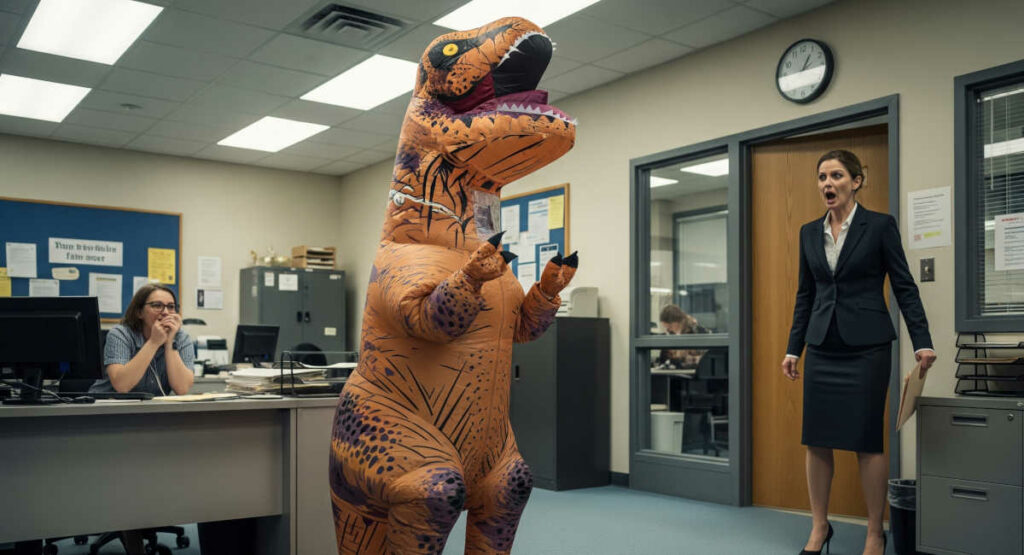The office lunch thief is a special kind of villain. They operate with a brazen disregard for the sacred bond between a person and their lovingly packed leftovers. They are a mystery wrapped in a riddle, hidden behind a thin veneer of plausible deniability. But what happens when the thief isn’t a phantom, and everyone knows who it is? For one group of fed-up coworkers, after their complaints went unheard, they decided to serve up a dish of revenge that was all in the thief’s head.
We have a lunch thief in our office, but he’s not very good at being discreet. We all know it’s Kevin from sales. He’s a black hole of other people’s food. After he ate an entire pan of my mom’s lasagna last week, his victims decided to form a coalition. We couldn’t poison him, but we realized we didn’t have to. We just had to make him think we did.
The Fridge Fiend
Kevin’s reign of terror over the breakroom fridge has been long and shameless. He’s eaten entire pizzas, containers of homemade soup, someone’s special birthday cupcake—if it looked good, it was gone by noon. We tried everything. We put angry notes on our food. We confronted him directly, but he’d just give a smirking, “Wasn’t me, must have been someone else.” We complained to HR, but without video evidence, they said their hands were tied.
The final straw for me was the lasagna. My mom had made it for me. It was a perfect, cheesy, glorious brick of comfort food. I was looking forward to it all morning. I went to the fridge at lunchtime, and the entire glass pan, save for a few sad smudges of sauce, was empty. It was a crime scene. That afternoon, I created a secret group chat with the other victims. It was called “The Lasagna Accords.” It was time to fight back.
A Recipe for Revenge
We knew we couldn’t put anything dangerous in the food. The goal wasn’t to harm him, but to install the fear of God into him every time he looked at a piece of food that wasn’t his. The plan was simple, and the revenge would be purely psychological.
The next morning, our co-conspirator Sarah, who is an amazing baker, brought in a pan of the most decadent, fudgy-looking chocolate brownies I’ve ever seen. She left them on the breakroom counter with a simple note: “Please enjoy!” The bait was set. We then spent the next hour walking past Kevin’s desk, talking loudly about the brownies. “Oh my god, Sarah, those brownies are life-changing!” one of us would say. “I know, right? I had two!” another would add.
As predicted, by 11 AM, Kevin had taken the bait. Hard. He had devoured at least four of them. We saw the chocolate smudges on his keyboard. Phase one was complete.
The Placebo Effect is a Powerful Thing
At 12:30 PM sharp, Sarah executed phase two. She sent an email to our department-wide mailing list, from which we had secretly removed Kevin. The subject line was: “URGENT APOLOGY – Regarding the Brownies.”
The email read: “Hi Team, I am writing this with the deepest and most sincere apology. I am absolutely mortified. My sister was visiting and, as a horrible prank, she swapped the sweetener in my brownie recipe with a new, super-strength, sugar-free laxative. I just found out. If you ate a brownie, please be aware you may need to remain… in close proximity to a restroom for the next 4-6 hours. I am so, so sorry for the impending disaster.”
The rest of us in the “know” immediately began the performance. One coworker clutched his stomach and did a theatrical sprint toward the men’s room. Another replied to the email with, “I ATE THREE. IT WAS NICE KNOWING YOU ALL.”
Kevin, who hadn’t received the email, saw the panic. He saw his neighbor’s screen. His face went from confusion to a pale, greenish horror. He started sweating. He rubbed his stomach. He was a ticking time bomb of his own creation. A few minutes later, he shot up from his desk and made a desperate dash to the bathroom, where he stayed for a very long time. He eventually emerged, looking ghostly, and told our boss he had a “sudden and violent stomach flu” and had to leave immediately.
The brownies, of course, were perfectly normal, delicious, and laxative-free. His gastrointestinal terror was a complete fabrication of his guilty conscience.
Kevin was out for two days. He came back looking humbled and has not so much as glanced at the community fridge since. We feel that justice has been served. But a friend I told said our prank was a form of psychological bullying. I think we gave a shameless thief a harmless but effective lesson. AITA for our brownie-based bluff?
This is a story of a workplace that, when faced with a lawless bandit, decided to become the judge, jury, and placebo-prescribing executioner. It’s a tale of perfect, victimless revenge. The lunch thief wasn’t harmed by a substance, but by his own guilty conscience and the power of suggestion. The pranksters didn’t just get him to stop stealing their food; they made him terrified of it, a far more effective and long-lasting solution.
What do you think, readers? Was this a brilliant and harmless prank that perfectly fit the crime, or was it a cruel act of psychological warfare that went too far? Let us know your thoughts!



















0 COMMENTS